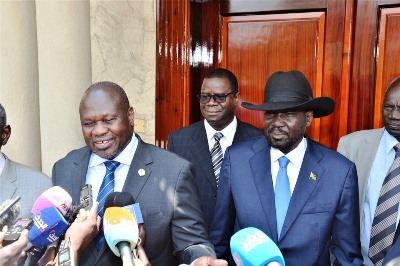Dispute over outstanding issues will not delay unity gov’t: official
October 12, 2019 (JUBA) – The ongoing dispute with the opposition over the number of states and boundaries will not affect the formation of South Sudan’s transitional national unity government in November, an official said.

Speaking to reporters in the capital, Juba on Thursday, the presidential advisor on security, Tut Kew Gatluak said the new government would be formed despite the armed opposition faction’s (SPLM-IO) insistence on resolving all the outstanding issues.
“All arrangements on the implementation of the peace agreement are done and we are ready to form the transitional unity government on time without any delay,” said Gatluak.
“The issue of states and boundaries will not delay the formation of the transitional unity government,” he added.
Also chairman of the National Pre-Transitional Committee (NPTC), Gatluak said all the outstanding issues will properly be resolved when the transitional national unity government has been established.
NPTC is the body mandated to implement the revitalized peace agreement South Sudan’s warring parties signed in September 2018.
A senior United States official on Thursday warned that Washington may consider imposing sanctions on South Sudan if the country’s rival leaders fail to form national unity government on November 12.
“We’re not prepared to continue to see delays, we’re not prepared to continue to hear arguments for why more time must be given,” Bryan Hunt, Sudan and South Sudan office director at the State Department told reporters at the US Institute of Peace.
“Our view is that if the government is not formed by November 12, we’re going to need to re-evaluate the relationship between the United States and South Sudan,” he added.
Hunt, however, said US sanctions would target South Sudan’s economy, like its oil, because they would risk worsening the plight of people living in a country that partly depends on foreign aid for survival.
He said the international community should act to end violence in South Sudan.
“We believe that international sanctions are the strongest message to send to South Sudan,” said Hunt, citing UN sanctions as an option.
South Sudan descended into war in mid-December 2013 when President Salva Kiir accused his former deputy Riek Machar of plotting a coup, allegations the latter dismissed.
In September 2018, the rival factions involved in the conflict signed a peace deal to end the conflict that has killed tens of thousands of people and displaced over 2 million people in the country.
The rival parties, in May, agreed to form a power-sharing unity government as part of a deal to end the war by November 12.
(ST)
